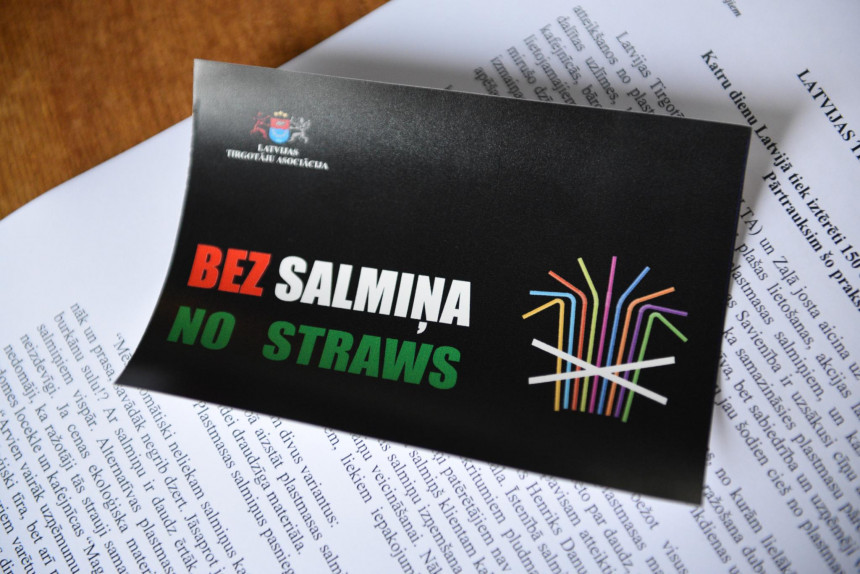The ban on plastics will not prohibit too much

The Saeima is urgently working on a bill that will prohibit the use of certain types of plastics in certain consumer products. However, partygoers, caterers and beauticians do not have to panic - everything is replaceable, and the manufacturers have already thought about it beforehand.
The draft law prepared by the Ministry of Environmental Protection and Regional Development has not been made because politicians at the national level have suddenly realized the evils hidden in plastics. Plastic is a great invention that allows you to create products of any shape for any purpose. However, there are problems with plastics management, because not all plastics are recyclable and reusable, and not all nations understand the importance of waste management in keeping the planet alive. They just throw their trash in the ocean. The European Union has therefore adopted "Directive (EU) 2019/904 of the European Parliament and of the Council of 5 June 2019 on the reduction of the impact of certain plastic products on the environment." For their part, Member States must choose how to achieve the objectives of the directive and transpose the directive into national law. Deadlines are coming up, as various restrictions and bans on the use of plastics come into force as early as July, while the government has been overwhelmed with solving coalition spats and pandemic this whole time. Therefore, the draft law “Law on Plastic Products” is being promoted only now and as a matter of urgency. The draft law and its annotation can be found here (in Latvian).
The plastic will not disappear on July 2
The main message is that from July 2, the following disposable plastic products will no longer be available on the Latvian market: cotton swabs, cutlery (forks, knives, spoons, chopsticks), plates, straws, beverage mixing sticks, as well as balloon attachments and holder sticks and their mechanisms. Food and beverage packaging made of expanded polystyrene, their stoppers and lids, drinking glasses and lids, as well as disposable and reusable products made of oxo-degradable plastic will also be banned. It should be recalled that this type of plastic was once declared salvation from the pollution of the planet, but later it had to be concluded that plastic remains plastic even if it breaks into small pieces. However, the new bans do not mean that in the future food will have to be served only on porcelain plates, and a finger will have to be used instead of a cotton swab. And it doesn't even mean that on July 3, all these wonderful things will disappear from store shelves. Firstly, the directive and the law will allow stocks of disposable plastic products to be sold out, and China has been able to supply the European market with them for many years to come, and secondly, all plastic items can be substituted and there are already viable alternatives. Well, all right, wooden forks are complete nonsense, but recyclable plastic forks will be allowed.
Traders are already prepared
One of the leading suppliers of the HoReCa sector in Latvia is the company Gemoss, they are also wholesalers and retailers of disposable tableware and cutlery. Sales manager Agrita Rubīna tells Neatkarīgā that the upcoming ban on disposable plastics does not come as a surprise for the company, as it was announced in time. And it will not cause any significant inconvenience to traders or buyers. Already, most buyers prefer only disposable sugarcane plates that can be composted or incinerated. However, they are more expensive. Other items are replaceable with recyclable plastic. Disposable plastic beer glasses will be allowed to be sold as before because paper glasses are not suitable for alcohol. But you will have to get used to paper cocktail straws. However, according to the company's representative, people get used to everything, and to pay a little more so that we do not leave a polluted planet for our children is really worth it.
Polluting third countries is allowed
At the moment, it seems that the whole planet is not polluted with cocktail straws, but with face masks. However, the ban will not apply to plastic goods if they are manufactured for medical purposes. Masks cannot be banned, just like tampons, sanitary pads, cigarette filters and wet wipes. These plastic products are an objective necessity. The law will only require them to be marked accordingly.
According to Article 3 of the draft law, the changes will not apply to food packaging for dried food, packaging for raw meat, as well as primary packaging in which food is sold in more than one portion.
Good news for Chinese commodity intermediaries and producers of disposable plastic products in Europe - the requirements of the bill do not affect exports to third countries.
The Member States of the European Union will continue to be allowed to pollute the environment of third countries with plastic waste without restriction.
*****
Be the first to read interesting news from Latvia and the world by joining our Telegram and Signal channels.